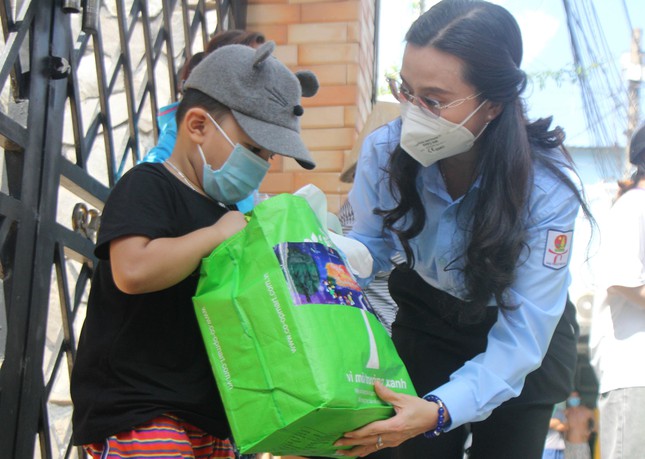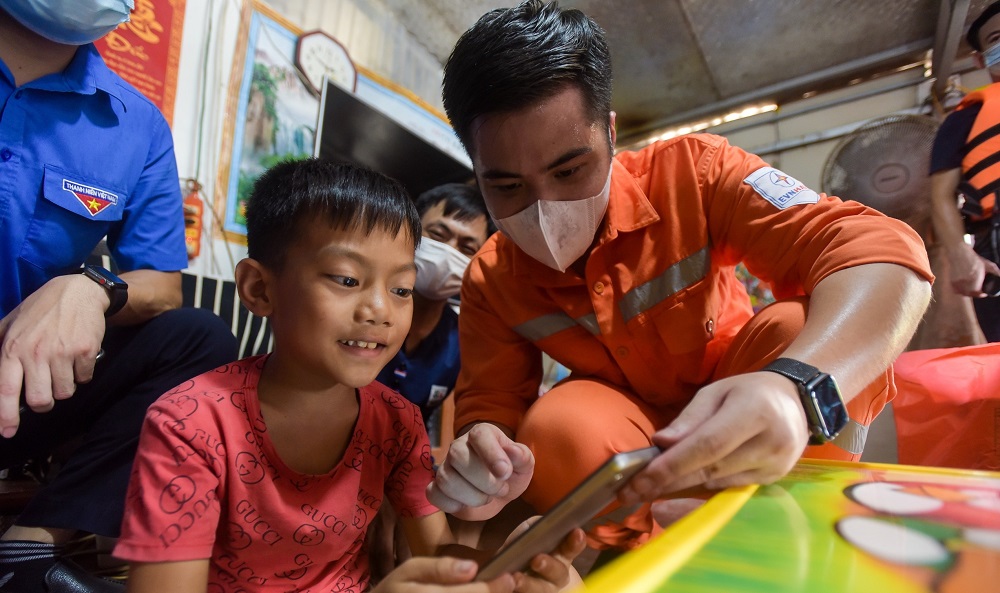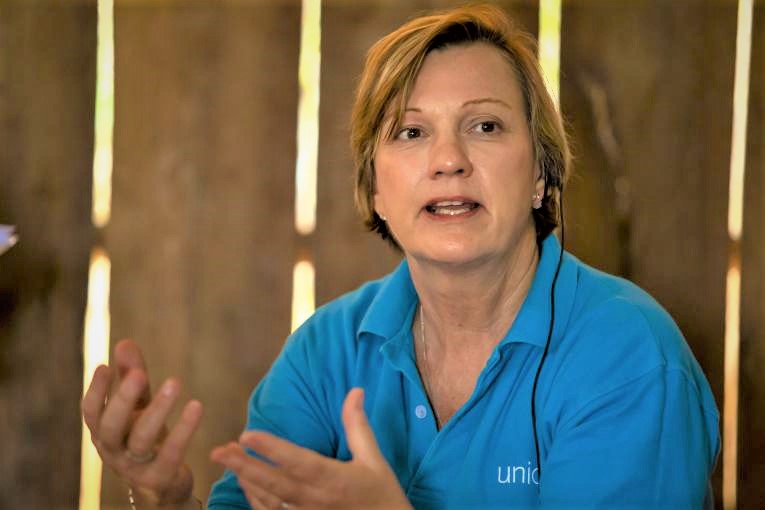Covid-hit orphans in Vietnam: stakeholders seek optimum solutions
The situation of orphans has triggered concerns about the long-term support for their lifelong interests.
More than 1,500 children in Ho Chi Minh City have lost their parents due to Covid-19 and the number will likely increase when details from other provinces are available, triggering concerns about the way to treat them to ensure that they will receive as much care and love as possible after big losses.
| Vulnerable children in Ho Chi Minh City receive support from the youth union. Photo: HCMC Youth Union |
N.T.L, 20, and her brother, 17, living in path No.118, Ben Phu Dinh, Ward 16, District 8 remain in shock after the death of their mom and two aunts.
The day when they returned home from hospitals, the cozy atmosphere was no longer there with the absence of some of their dear ones. All six family members were infected with the virus and treated in six different hospitals. After some time, half of them never came home again.
“I was grieving at the death of auntie Ba when I was being treated in hospital. Shortly after that, they told me about auntie Ut’s death then my mom’s, I had no more tears left for them. Three of my closest relatives died of the pandemic. No one got to see anyone’s face for the last time, all were taken to be cremated in Binh Hung Hoa crematorium,” N.T.L told The Hanoi Times.
“My brother and I were discharged from the hospital. When I got home, I couldn’t believe my eyes, the house looked like being abandoned for years. Since then, two of us have not experienced a single night of good sleep. Sometimes, we woke up at night after dreaming of our mom and aunties, sometimes because of caterwaul,” she said in sobs.
Lawyer Dao Kim Lan, director of An Thuan Phat Law Firm, recalled: “When N.T.L told me that her mother deceased in hospital and her father was in critical condition, I asked for help everywhere, including from doctors and especially psychologist Phan Thi Mai Quyen, to make sure the siblings would not be shocked.”
Being in the “red zone” (high-risk area), L and her brother have lived on the support of residents, donors, and grassroots authorities for the past few days, Lan said.
Quach Xuan Hoang, 19, is another typical case for bearing the brunt of the pandemic. His mother died on the day that the whole family thought she was able to be discharged from Nguyen Tri Phuong Hospital after two weeks of treatment.
Hoang, his sister, and a 6-year-old niece tidied up the house to welcome their mom home and they were in shock because she never showed up.
Since his mom’s death, Hoang has never stepped outside the door, spent nights sleepless, and hardly spoke with the family members, his father – Quach Minh Khi – told The Hanoi Times.
Khi who lives in Ward 10, District 6, said he was also shocked to get the news of his wife's death though he came to take care of her every day. However, what he is concerned about most now is his son, Hoang, who used to be an active student scoring high grades at Sai Gon University, becomes a taciturn person and looks depressed after his mother’s death five weeks ago.
| Vietnam Electricity (EVN) grants tablets to vulnerable children in Hanoi for online learning. Photo: Khanh Huy/ The Hanoi Times |
Alternative care
Given the large number of orphans in the pandemic, authorities in Ho Chi Minh City and Vietnam have taken actions to help them overcome difficulties both in the short term and long term.
State-run organizations like Youth Union have offered financial support and computers to needy children to facilitate their online learning.
For the long-term solutions, the Ministry of Labor, Invalid, and Social Affairs (MoLISA) on Sept 23 issued guidance to prioritize family-based alternative care within communities for children orphaned by Covid-19.
Sharing the same idea, a statement by Rana Flowers, UNICEF Representative to Vietnam, released on Sept 26 said that UNICEF welcomes MoLISA’s guidance, saying it’s the timely decision to ensure that children deprived of parental care due to Covid-19 receive the support they need to overcome this challenging period.
“It is heartwarming to see the outpouring of support and the willingness of individuals and businesses to support the children. But, UNICEF cautions that it is absolutely crucial in such stressful and challenging times to ensure that the solutions chosen are in the very best interests of the child, designed to keep children connected to their communities, placed in family environments where they can grow and prosper,” showed the statement.
She argued that the Convention on the Rights of the Child with years of research makes it very clear that institutions and facilities are not the right or even a safe place for children. “We must work together as quickly as possible to find ‘family’ environments for the children,” she noted.
Rana Flowers affirmed that the immediate and long-term damage caused by family separation and placement in institutions on children is well documented in regional countries and the world.
She went on to say that many countries have instead developed a child protection system that ensures alternative family placements are identified and monitored, government allowances are provided, allowing children at risk to stay in a family environment, in their community, connected to what they know, able to attend the same school with the same friends and supportive community.
“As Covid-19 continues to devastate families and communities, we must protect every child’s right to live and grow up in an environment that supports their physical, psychological, social, and emotional development. The call to action to ensure children can thrive in family-based care environments rather than in institutions matters now more than ever as the communities address unprecedented challenges caused by Covid 19,” she emphasized.
| Rana Flowers, UNICEF Representative in Vietnam. Photo: Truong Viet Hung/ UNICEF Vietnam |
Great support
Earlier in mid-September, Chairman Truong Gia Binh of FPT Corporation, the largest information technology company in Vietnam, announced that the company will raise about 1,000 children who are orphaned by Covid-19 until they reach early adulthood.
FPT Corp, which also has universities with nearly 20,000 students, of whom about half are majoring in IT, will assume responsibility for feeding and teaching children until they finish higher education or post-graduate programs depending on their capability, Binh told local media.
The funding, which costs VND80 billion (US$3.5 million) per year, will last for 20 years. “For children who have lost their parents due to Covid-19, I want to create an environment for them to study and turn their pain into strengths to conquer the heights,” Binh said.
FPT City Danang will be their future home and school.
According to Binh, the school will be built in a model of a military academy that helps them, as cadets, get along with friends, practice disciplines, spend time studying and developing skills and then serve their homeland. “The greatest human strength is to be loved and to love others. In the academy, children learn to love and give back their love to life,” he noted.
The academy’s curricula and training programs will be built based on both learning and doing together, helping vulnerable children to nurture their compassion, learning martial art, traditional music, and soft skills to become well-trained people. Binh said the curricula would be particularly designed by experienced educators, teachers, and himself.
Binh’s charity project has caught public attention with a large number of netizens supporting his idea.
In the latest move, FPT has announced that it will recruit executives for the training program and welcome all ideas but no money for the orphan-raising plan.














